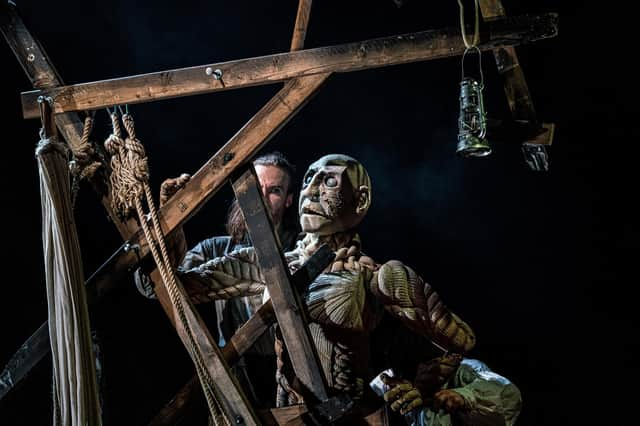Frankenstein on the Eastbourne stage: horrible imaginings become starkly dramatic theatre


Horrible imaginings are turned into starkly dramatic theatre this week at Eastbourne’s Devonshire Park, where BlackEyed Theatre present Mary Shelley’s Frankenstein.
The show is a faithful revival of BlackEyed’s 2016 production, much enjoyed at the time by this Eastbourne Herald reviewer! As all live theatre, it still pulses with dramatic impact.
Advertisement
Hide AdAdvertisement
Hide AdThe simple title of Frankenstein evokes some of the wrong images: Boris Karloff and crew did no favours to Mary Shelley, for her original story is much more profound than the hammy clichés and schlock-horror effects which have been spawned from it. She wrote it at only 21 years old; and from the pen of a woman author in the early 19th Century it breaks astonishing new ground.
Director Eliot Giuralarocca and adapters Nick Lane and John Ginman have at once stayed faithful to the original, and yet given it new impact: a study in human aspiration, human frailty and human tragedy.
Mary Shelley's novel is a remarkably precocious and daring work. It anticipates many of the dilemmas still confronting modern science: does a scientist simply explore and experiment, and leave the world to be scorched by the hot coals of his or her findings? Or are there limits, are there places where science should simply never go? The greed for knowledge is threaded through both science and human imagination: from Prometheus to Faust to Galileo and beyond. If I had known, wrote Albert Einstein, I would have been a watchmaker…
In the show's programme Giuralarocca speaks of the "obsessive scientist usurping God", and in the title role of conflicted scientist Victor Frankenstein, Robert Bradley convincingly embodies the driven, almost greedy obsession of a man who seeks to create life. “Nature is a secret that I have to reveal…”
Advertisement
Hide AdAdvertisement
Hide AdThe journey of discovery which will end in tragic destruction begins in relative innocence. Frankenstein is a young student version of Marlowe's Faustus, brought up in a civilised, educated family in Geneva but drawn to the University of Ingolstadt – in Mary Shelley’s time, a centre of excellence in medical research.
Robert Bradley's descent to destruction is measured, gripping and genuinely poignant. He progresses credibly from eager student to driven, self-destroying wreck - a tricky journey for an actor to take in a couple of hours. Surrounding him, the other four actors are uniformly excellent, switching roles with ease and confidence.
The play opens, so to speak, at the end, before the story moves backwards in time. Frankenstein's Creature has been banished to the Arctic wastes, where the ship of Captain Robert Walton sits gripped in the ice. Benedict Hastings’ Walton is a voice of reason, urging but unheeded. Its prow, hugely dominating the stage, is a bold choice by set designer Victoria Spearing, becoming a flexible part of the set and the action – but if it looks like a ship and creaks like a ship…
But the design has an atmospheric and suitably period feel, and with clever use of costume, lighting and sound, both story and characters develop effectively. Alice E. Mayer's Elizabeth is by turns tender, exasperated, bewildered by Victor’s behaviour. Billy Irving voices the Creature with an aching passion, and Max Gallagher is a smart and rather amiable foil to Victor.
Advertisement
Hide AdAdvertisement
Hide AdAll the players are accomplished actor-musicians – three of the five, according to the programme, are graduates of the Rose Bruford College which has virtually patented that genre of performer. And the music, never intrusive but always appropriate, adds an atmospheric dimension which pre-recorded music cues can never achieve. Fractured and percussive as it follows Victor’s steps into the unknown. Haunting and disembodied as the Creature wails and pleads.
Victor’s journey into unknown research is to become a descent into madness, belied by his softly academic Edinburgh lilt. Ah, but was that fine city not the home of Burke and Hare..? And when, just before the interval, Victor's collection of body parts comes breathtakingly to life, there is an electrical charge not simply through the Creature but through the whole audience.
The second half demands quite some stamina, and could benefit from a few minutes’ less dialogue. Eloquent and heartfelt it may be; but it is the images, rather than the words, that will remain in the minds of the audience.
The company pulled off a coup in enlisting Yvonne Stone, one of the key War Horse creatives, and since then puppetry has continued to break new ground. Her Creature is brilliantly effective: disconcertingly not-quite-human, and expertly manipulated by the actors, a hideous form hiding a gentle nature. Voiced by Billy Wilding with dialogue that draws touching sympathy, rather than horror, the Creature is ultimately a partner in Victor's tragedy.
Story-telling, imagination, and technical expertise: yes, this is fine theatre, a powerful human parable - and a production well worth reviving.
Review by Kevin Anderson